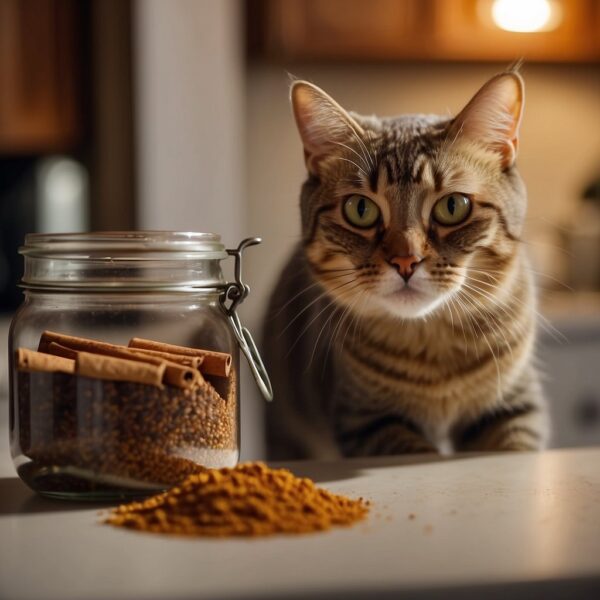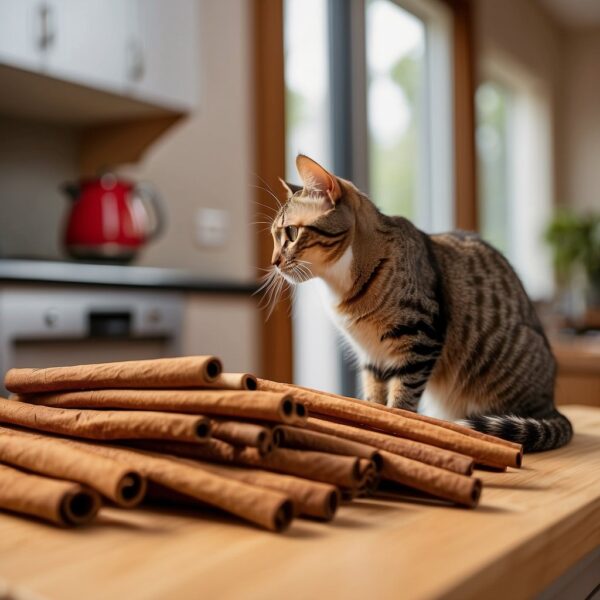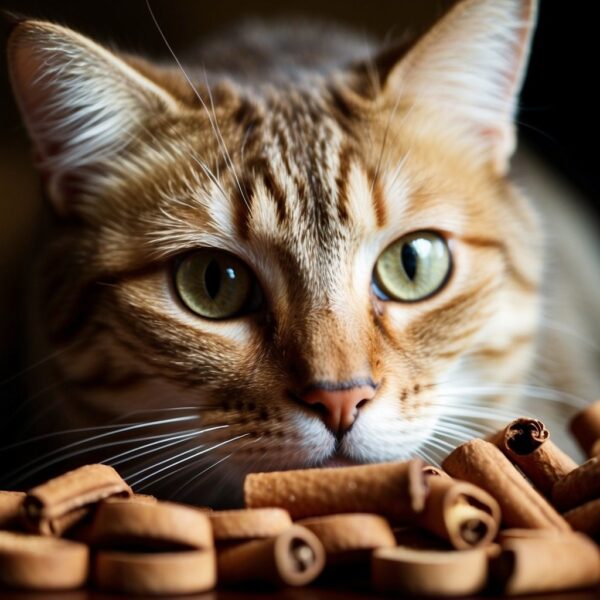
Cats And Cinnamon? Understanding the Risks
Cinnamon is a popular spice loved for its warm and sweet flavor, commonly used to enhance the taste of various dishes and beverages. Its aromatic presence can catch the attention of pets, including cats, who may be drawn to its scent. Can cats eat cinnamon safely? While a sprinkle of cinnamon can be a delightful addition to human cuisine, it raises a question of safety when it comes to our feline friends.
Understanding the effects of cinnamon on cats is essential for cat parents. Though the ASPCA classifies cinnamon as non-toxic to cats, it is important to consider the type and quantity of exposure. Ingesting a large amount of cinnamon could lead to health complications, and essential oils containing cinnamon should be avoided due to their high concentration, which can be particularly harmful to cats.
Key Takeaways
- While not considered toxic, cinnamon can be harmful to cats in large quantities or concentrated forms like essential oil.
- Cat parents should avoid exposing cats to cinnamon to prevent potential health risks.
- Even though cinnamon’s risks for cats can be managed, it is prudent to consult with a veterinarian for safety advice.
Understanding Cinnamon
Cinnamon is a popular spice derived from the inner bark of trees from the genus Cinnamomum. Utilized for its distinctive aroma and flavor, cinnamon can enhance a variety of dishes and beverages. This spice comes in two primary forms: cinnamon sticks and powdered cinnamon. Cinnamon sticks are the dried bark rolled into quills, while powdered cinnamon results from grinding the sticks.
Not all cinnamon is created equal. There are multiple species of cinnamon, but the two most common types found in stores are Ceylon cinnamon and cassia cinnamon. Ceylon cinnamon, often referred to as “true cinnamon,” is native to Sri Lanka and southern parts of India. It is considered to be milder than cassia. On the other hand, cassia cinnamon, which is more widely available and less expensive, is generally harvested in China and is known for its stronger, more pungent flavor.
In terms of chemical composition, cinnamon contains several beneficial compounds, including cinnamaldehyde, cinnamic acid, and cinnamate. These substances contribute not only to its distinct smell and taste but also to its antioxidant properties. Despite its widespread use in human cuisine, the impact of cinnamon on pets, specifically cats, is a subject of concern for many veterinarians and cat parents.. The properties that make cinnamon favorable in human consumption may not translate safely to feline health.
Understanding the background and properties of cinnamon is crucial when considering its use in environments shared with pets. Proper storage and cautious application in households with cats is advised to prevent accidental ingestion, which can be harmful.

can cats eat cinnamon? The Risks
While cinnamon is not classified as toxic to cats, it can pose various health risks that cat parents should be aware of. Different forms of cinnamon can affect felines differently, and understanding the potential dangers is crucial for their safety.
Toxicity and Side Effects
Cinnamon toxicity in cats can result from ingestion or even skin contact with the spice. Exposure to cinnamon essential oils or powders can lead to skin irritation or more severe internal effects, such as liver damage, if ingested in substantial amounts.
Allergic Reactions
Cats eating cinnamon can develop allergic reactions. Symptoms may include itchiness, rash, hives, or redness on the skin if in contact, or coughing and wheezing due to inhalation.
Cinnamon and Cats Ingestion Risks
Cats eating cinnamon, whether in stick, powder, or oil form, can result in gastrointestinal distress manifested as vomiting or diarrhea. Foods containing cinnamon, like cinnamon rolls or apples baked with cinnamon, should be kept out of reach.
Respiratory Concerns
Inhalation of cinnamon powder or scents from products like cinnamon brooms or candles can cause respiratory issues, ranging from mild irritation to severe breathing difficulties or bronchospasm.
Digestive System Issues
Cats that consume cinnamon may experience digestive system issues such as vomiting, diarrhea, or indigestion, as the spice is not a regular part of their diet and can be difficult for them to process.
Effects on Blood Sugar
Cinnamon can act as a blood thinner and affect blood sugar levels. Cats with a large intake might suffer from low blood sugar, posing a significant health concern.
Potential for Organ Damage
Liver enzyme elevation indicating liver damage, or in severe cases, liver failure, can occur, especially with repeated exposures to cinnamon or its oils. There’s also a risk for kidney damage and other organ failure.
Emergency Response to Cinnamon Exposure
If a cat is suspected to have been exposed to a dangerous amount of cinnamon, an emergency visit to a veterinarian is necessary. Treatment may include oxygen therapy, fluid therapy, and administration of vitamin K. The Pet Poison Helpline can also be contacted for immediate advice.
Preventative Measures for Cat Parents
Cat parents should prevent access to cinnamon and related products. They should be aware that diffusion of essential oils or use of air fresheners and scented decorations like cinnamon diffusers and candles can be harmful to cats.
Nutritional Alternatives to Spices
Cats have no nutritional need for cinnamon or other spices in their diet. As obligate carnivores, their dietary needs are adequately met with high-quality cat food rich in protein and essential minerals. Catnip may be offered as a safe alternative for enrichment.

cinnamon and cats Frequently Asked Questions
In this section, readers will find answers to common queries regarding the consumption of cinnamon by cats, including potential effects on health and steps to take in case of ingestion.
Is cinnamon toxic to cats if ingested?
Cinnamon is generally not toxic to cats, but it can become harmful if consumed in large quantities. Cats are especially sensitive to compounds like coumarin found in cinnamon, which can lead to health issues.
What are the effects of cinnamon on a cat’s health?
While not toxic in small amounts, ingesting cinnamon can cause symptoms such as coughing, choking, and difficulty breathing in cats. In severe cases, liver damage may occur due to the coumarin content.
Can ingesting cinnamon cause harm to my cat?
Yes, ingesting significant amounts of cinnamon can harm a cat. Symptoms may include vomiting, diarrhea, and a decrease in blood sugar. It can also irritate the mouth and digestive system.
Are there any safe amounts of cinnamon for cats to consume?
There is no established safe amount of cinnamon for cats to consume. It is generally advised to avoid giving cinnamon to cats altogether, as they are sensitive to the compounds in it.
How should I react if my cat has consumed cinnamon?
If a cat consumes cinnamon, monitoring for any signs of distress is crucial. If symptoms develop, contacting a veterinarian immediately is recommended. Providing water to the cat may help to reduce mild irritation.
Does cinnamon pose the same risks to dogs as it does to cats?
Cinnamon may not pose the same level of risk to dogs as it does to cats, but it is still not advisable for dogs to consume large amounts due to potential irritation and health complications. Consulting a veterinarian is recommended for concerns about cinnamon ingestion in dogs.